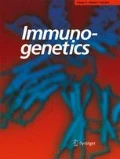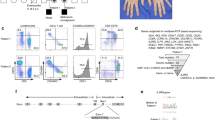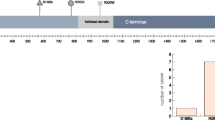Abstract.
We recently reported a novel autosomal recessive mouse mutation designated nackt (nkt). Homozygous mutant mice have diffuse alopecia and a marked reduction in the proportion of CD4+ T cells in the thymus and peripheral lymphoid tissues. Here we show that the CD4 T-cell deficiency is due to a defect in the thymic microenvironment rather than the hematopoietic compartment. Furthermore, we identified the molecular basis of the mutant phenotype by demonstrating that the nkt mutation represents a 118-bp deletion of the cathepsin L (Ctsl) gene which is required for degradation of the invariant chain, a critical chaperone for major histocompatibility complex class II molecules. This finding explains the similarities in skin and immune defects observed in nkt/nkt and Ctsl –/– mice. The data reported here provide further in vivo evidence that the lysosomal cysteine protease cathepsin L plays a critical role in CD4+ T-cell selection in the thymus.
Similar content being viewed by others
Author information
Authors and Affiliations
Additional information
Electronic Publication
Rights and permissions
About this article
Cite this article
Benavides, F., Venables, A., Poetschke Klug, H. et al. The CD4 T cell-deficient mouse mutation nackt (nkt) involves a deletion in the cathepsin L (Ctsl) gene. Immunogenetics 53, 233–242 (2001). https://doi.org/10.1007/s002510100320
Received:
Accepted:
Issue Date:
DOI: https://doi.org/10.1007/s002510100320




